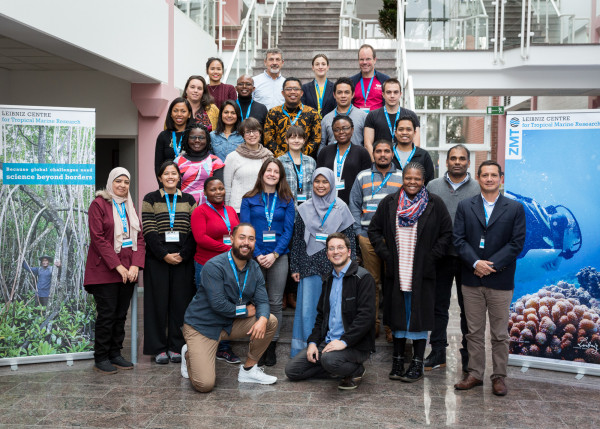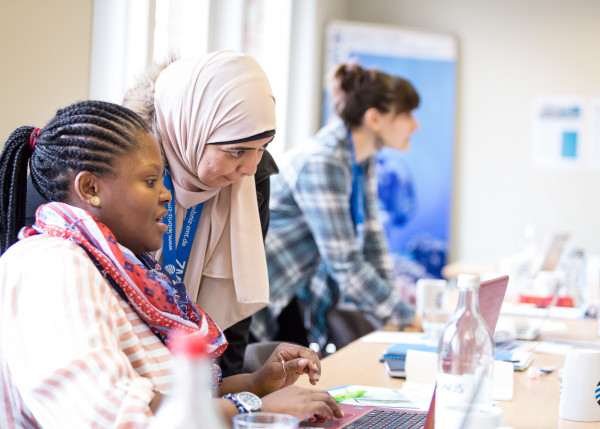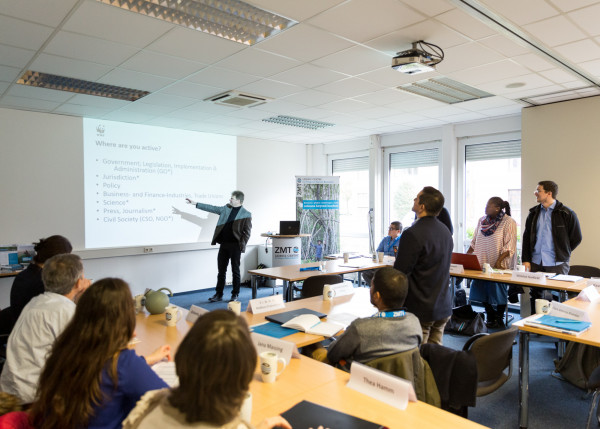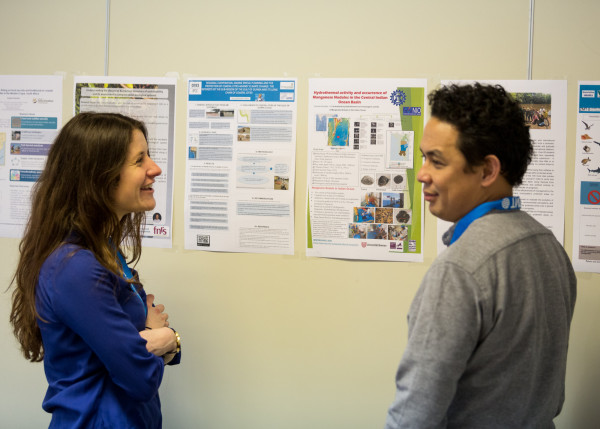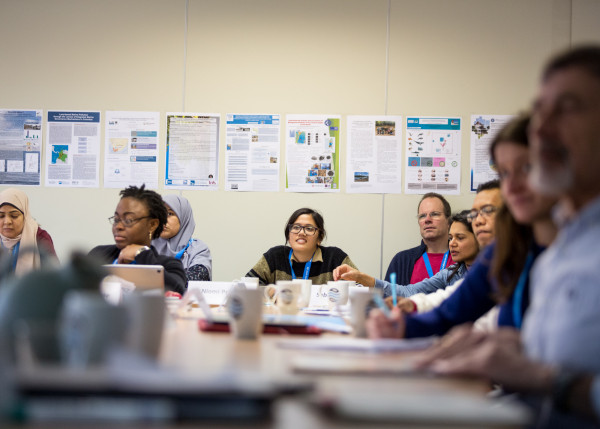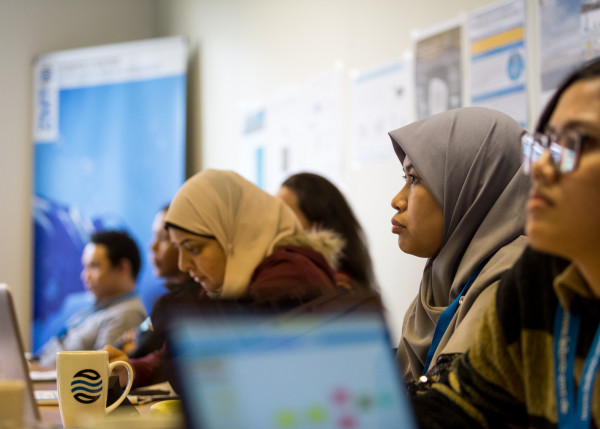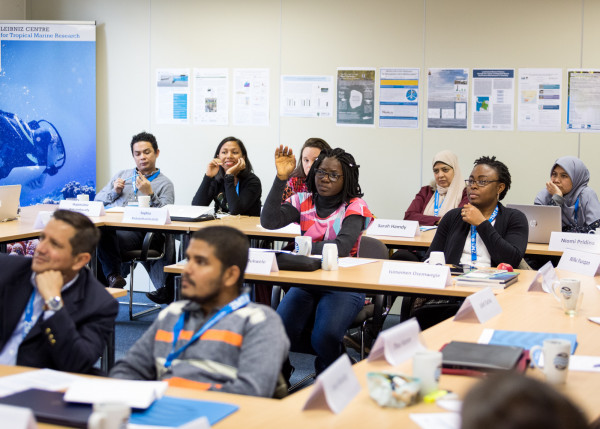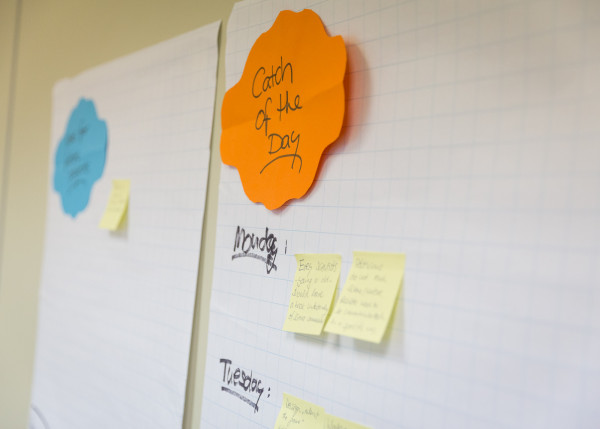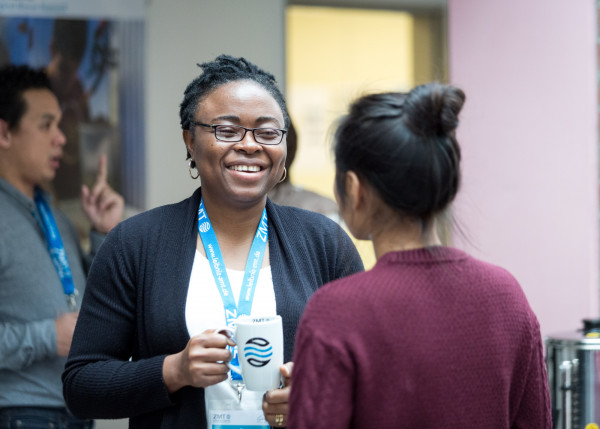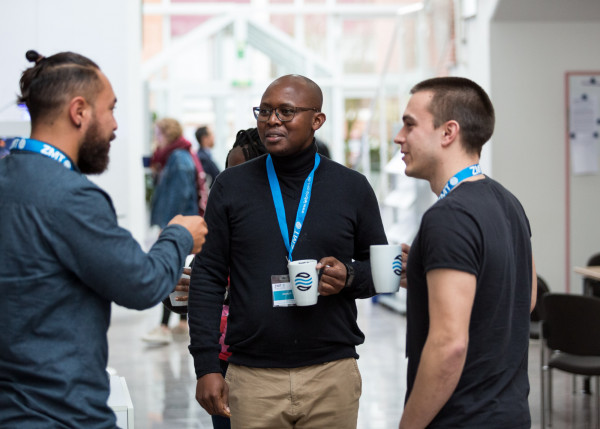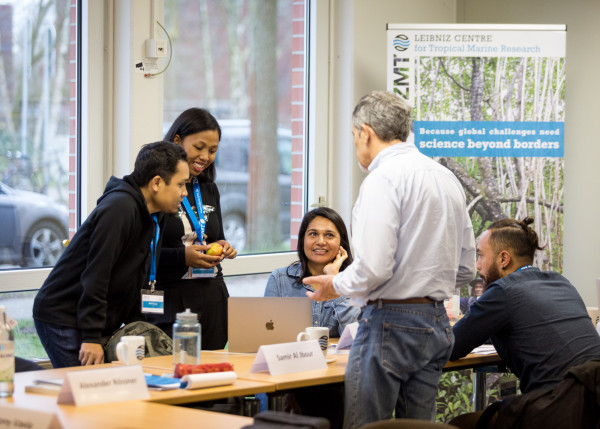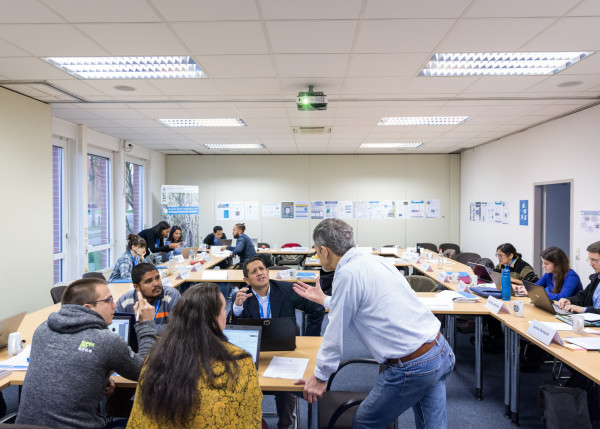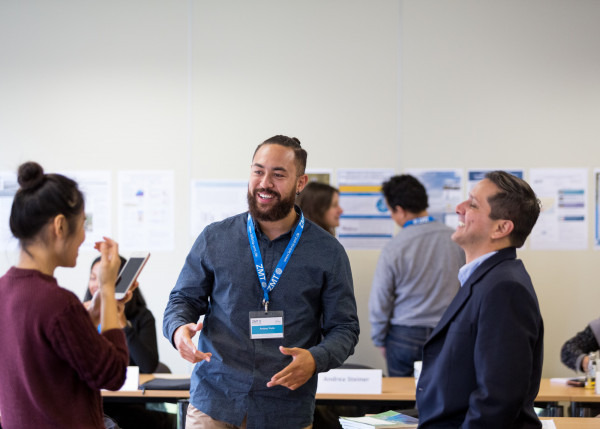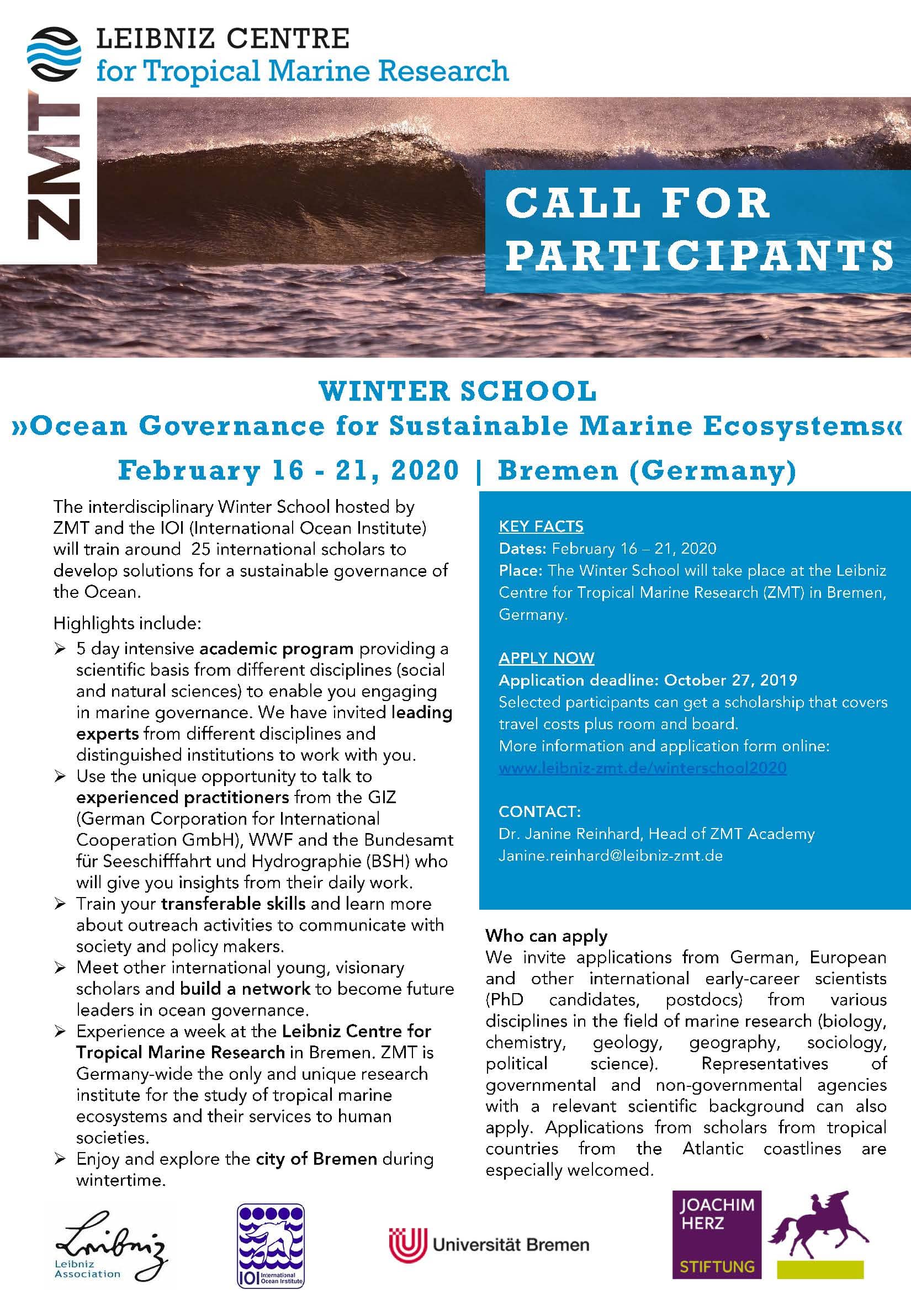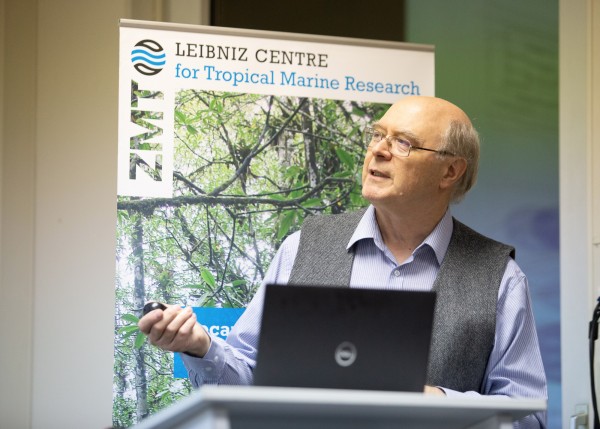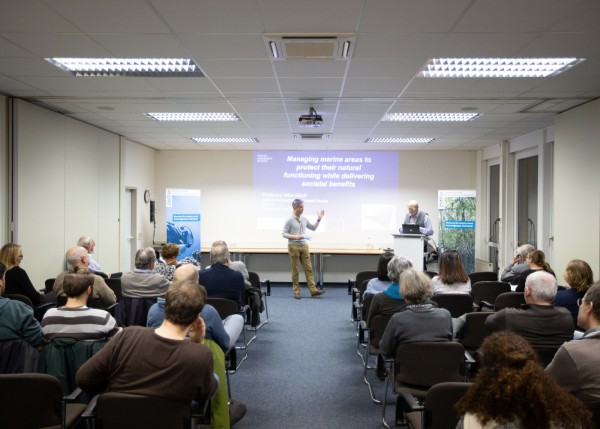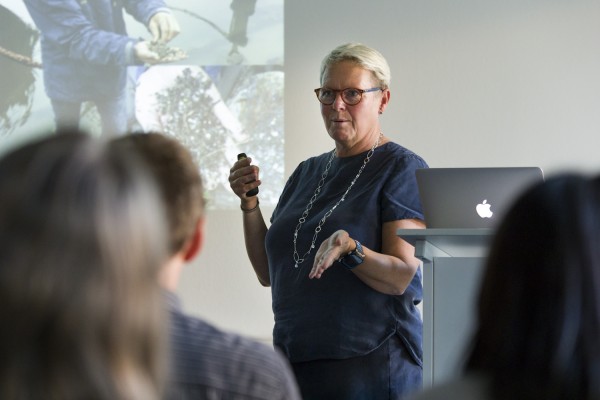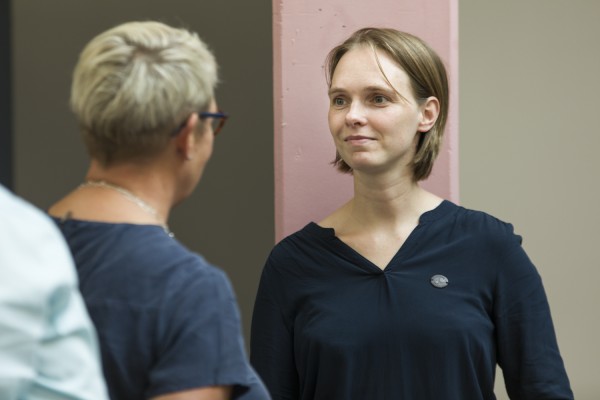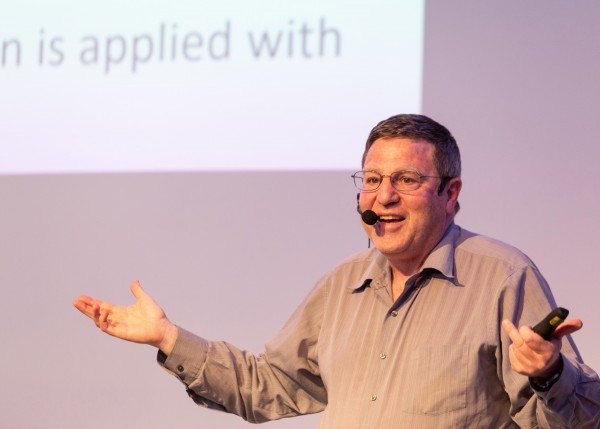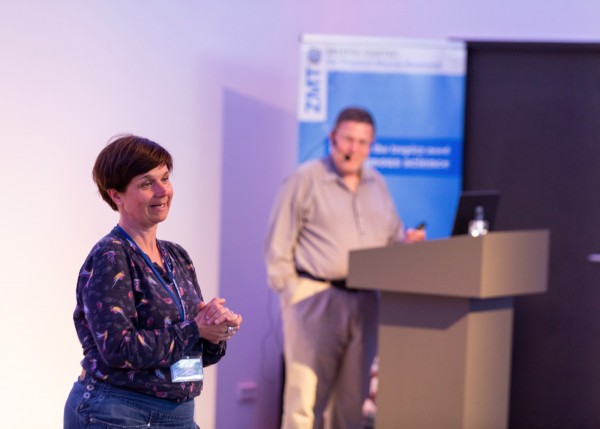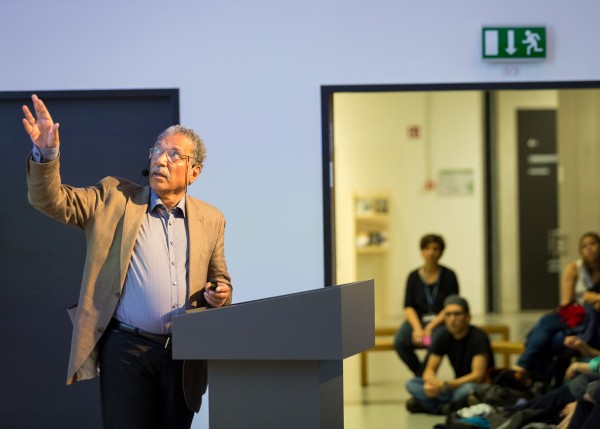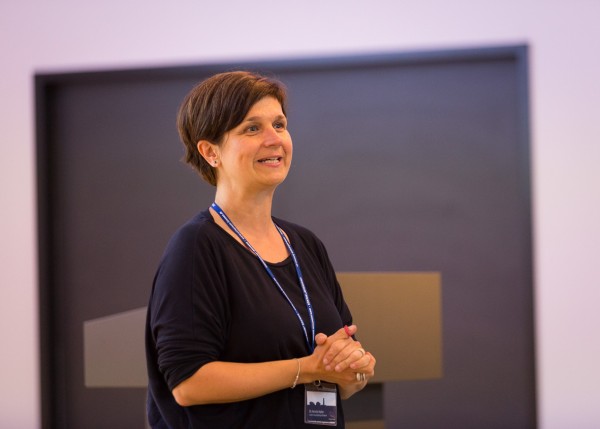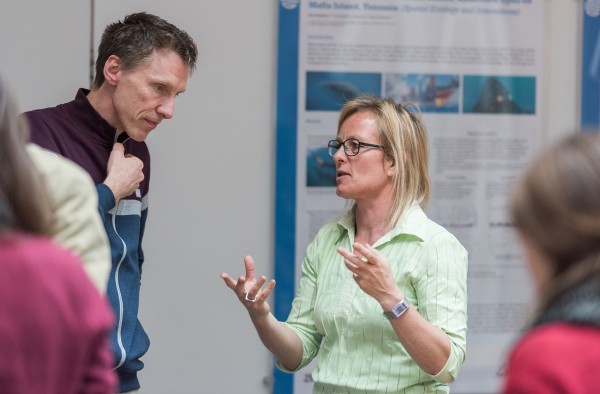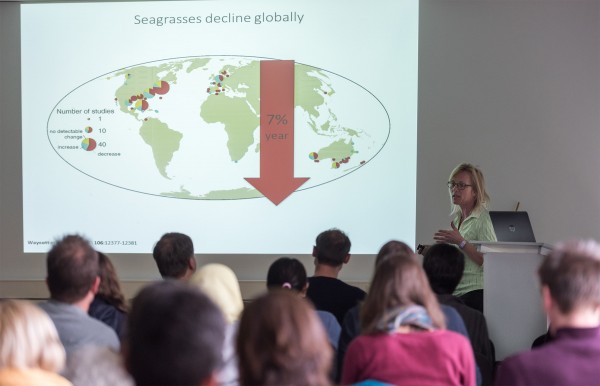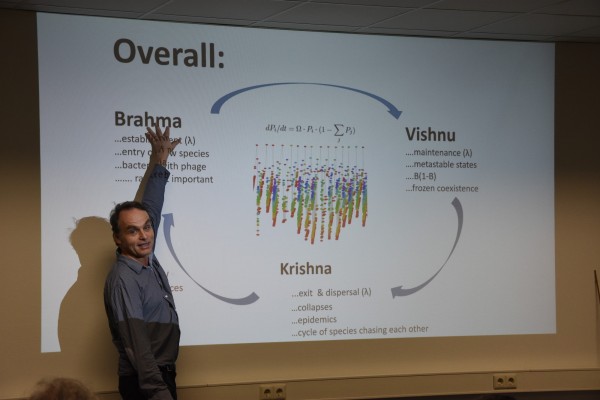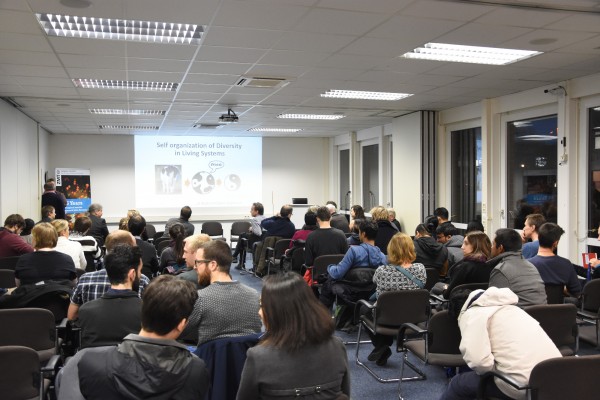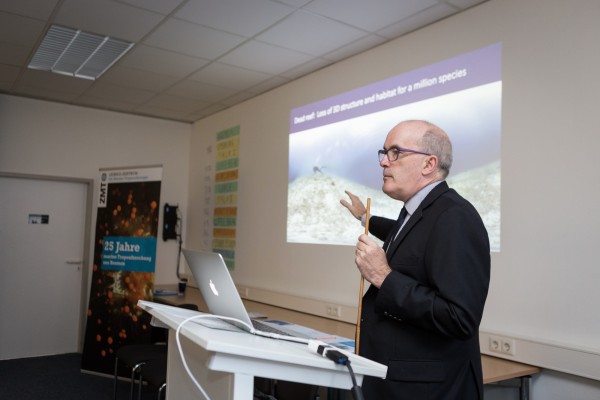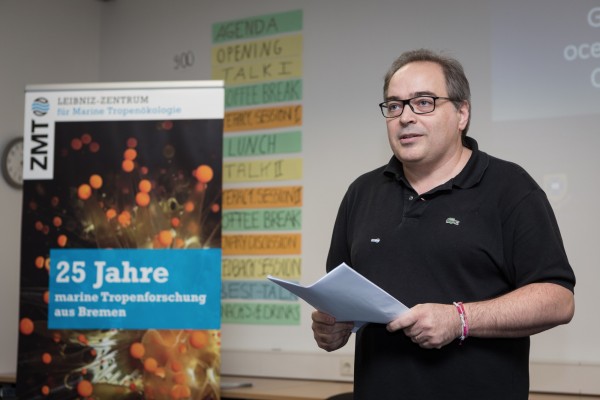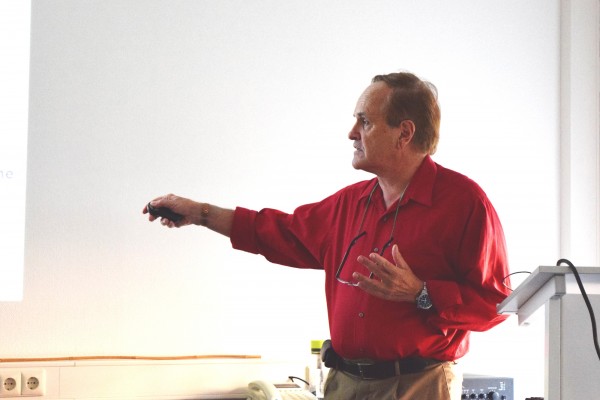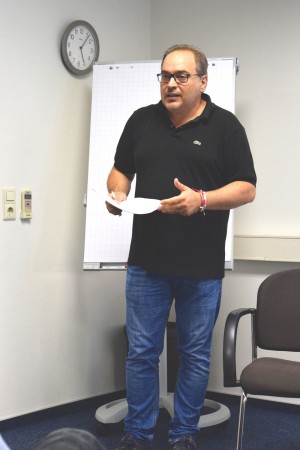Photos: Jan Meier
WINTER SCHOOL »Ocean Governance for Sustainable Marine Ecosystems«
by the Leibniz Centre for Tropical Marine Research (ZMT) and the International Ocean Institute (IOI) Germany
WHEN: February 16 to 21, 2020
WHERE: Leibniz Centre for Tropical Marine Research (ZMT) | Bremen | Germany
AIM AND CONTENT OF THE WINTER SCHOOL
The interdisciplinary ZMT/IOI Winter School trained 27 international scholars to develop solutions for a sustainable governance of the Ocean to sustain our marine ecosystems. The Participants came from 19 different countries, among which were also various tropical countries like Indonesia, Brazil, South Africa or Nigeria.
During a 5-day intensive academic program, young scholars were encouraged to discuss marine governance issues by providing a scientific basis from different disciplinary perspectives (e.g. natural sciences, political science, research, strategic planning). This approach allowed a thorough and holistic understanding of the topic.
In addition to various scientists from universities and scientific institutes who reported on their research, they also had the opportunity to hear different perspectives from experienced practitioners from GIZ (Gesellschaft für Internationale Zusammenarbeit), WWF and BSH (Bundesamt für Seeschifffahrt und Hydrographie).
The aim was to equip the participants coming from academia and politics with a reflected understanding of ocean ecosystem issues and governance and to develop a network of experts even beyond this course. The Winter school is one of ZMT´s contribution to the UN Decade of Ocean Science for Sustainable Development.
PROGRAMME
The program of this winter school (Feb 2020) can be found under this link.
Target group
Winterschool enabled visionary international early-career scientists from various disciplines in the field of marine research and young professionals who want to learn more about “Ocean governance” to meet and discuss frontier questions on future sustainable development.
The Winter School was generously supported by the Joachim Herz Stiftung and the International Ocean Institute (IOI).
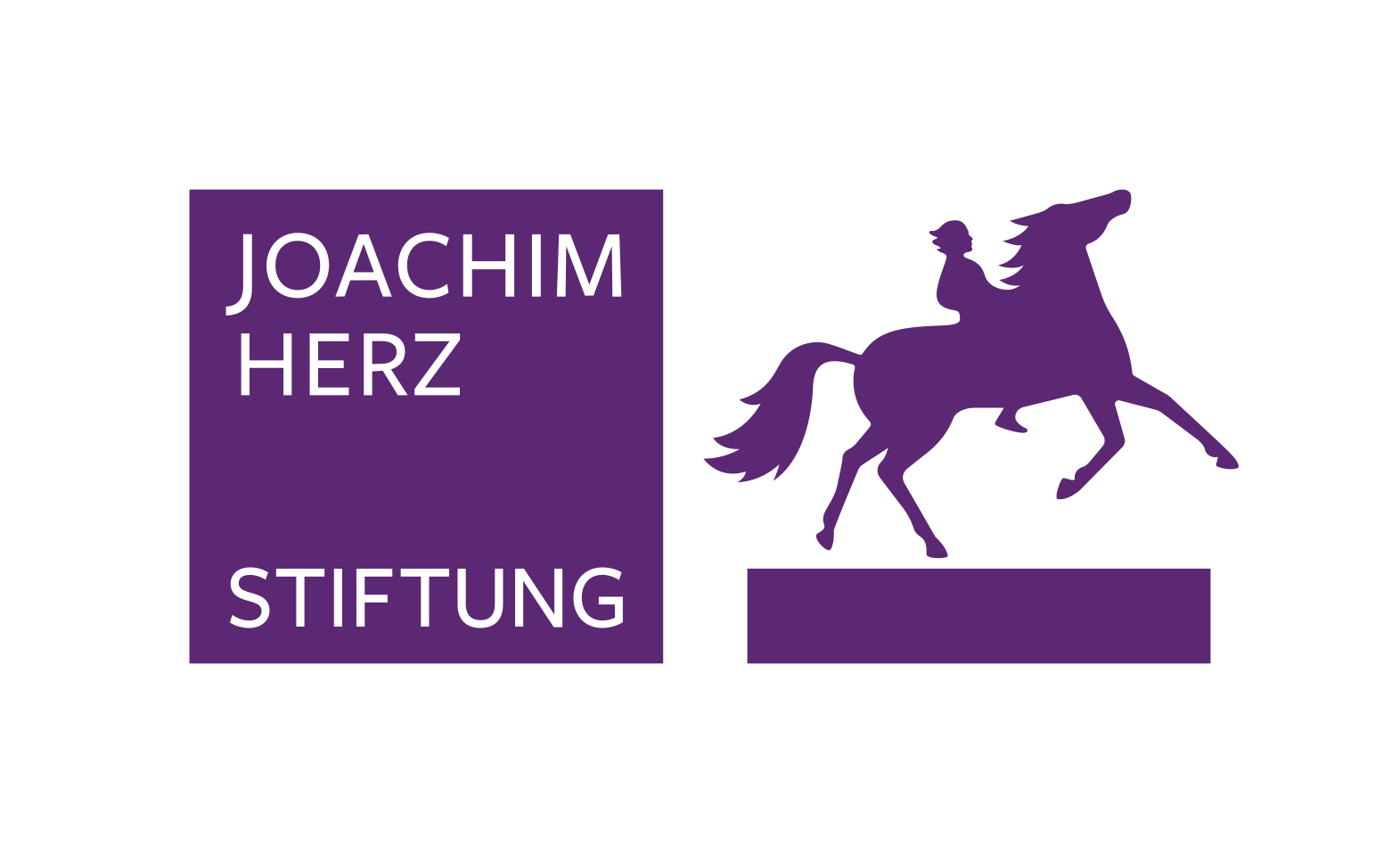
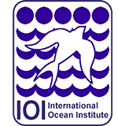
The application deadline is over. We have received more than 400 applications.
 Contacts
Contacts
Dr. Janine Reinhard
+49 (0)421 23800 - 860
This email address is being protected from spambots. You need JavaScript enabled to view it.Dr. Werner Ekau
+49 (0)421 23800 - 23
This email address is being protected from spambots. You need JavaScript enabled to view it.Prof. Dr. Anna-Katharina Hornidge
(formerly ZMT, now German Development Institute - DIE)
Workshop "Fish Barcoding and Functional Ecology: Monitoring the Status of Marine Coastal Ecosystems"
 Fotos: Levy Otwoma, KMFRI, und Mattia Ghilardi
Fotos: Levy Otwoma, KMFRI, und Mattia Ghilardi
Workshop Fish Barcoding and Functional Ecology: Monitoring the Status of Marine Coastal Ecosystems
September 26 – October 21, 2022
including two weeks (3/10/2022 – 14/10/2022) in-person training at the Kenya Marine and Fisheries Research Institute (KMFRI) in Mombasa, Kenya
The Leibniz Centre for Tropical Marine Research (ZMT) and the Kenya Marine and Fisheries Research Institute (KMFRI) have organised a comprehensive, fully-funded workshop on fish barcoding and functional ecology. The workshop is focused on the practical application of methods.
Core of the workshop will be a two-week in person training at the modern laboratory of KMFRI in Mombasa including a 2-day symposium for networking and to meet invited keynote speakers
- Dr. Monica Mwale, South African National Biodiversity Institute
- Prof. Sophie von der Heyden, University of Stellenbosch, SA
- Dr. Cynthia A. Adinortey, University of Cape Coast, Ghana
Time is provided for participants to share details about their projects.
I Workshop Contents
Online activities take place in the first and last week of the workshop and focus on asynchronous learning such as reading literature, video tutorials/talks, questionnaires and chat functions via the ZMT Academy e-learning platform. These tasks which can be scheduled individually are accompanied by video meetings mostly arranged between 1pm and 5pm (East African time EAT, equals 11:00 – 15:00 CET). The lecturers are Dr. Sonia Bejarano (ZMT), Dr. Levy Otwoma (KMFRI), Prof. Oscar Puebla (ZMT) und Dr. Achim Meyer (ZMT).
Week 1: The first week is filled with preparatory online activities to adjust background knowledge and lay the theoretical foundation.
Week 2 and 3: The physical presence part is divided into i) hands-on fish barcoding activities in the wet-lab such as tissue fixation, DNA extraction, PCR, qPCR, evaluate gel pictures, and ii) functional ecology training such as measuring morphological traits, functional ecology of cryptobenthic reef fish, ordering a species pool in a functional space. On site work follows the ZMT hygiene concept, but the corona situation for March is difficult to predict. In case of flight closures or obligatory quarantine duties we will either postpone or transfer to a hybrid event depending on the number of affected participants.
Week 4: The last week is working remotely with the generated data such as sequence assembly, database usage and phylogenetic trees, and to finally combine the biodiversity data by computing and plotting functional diversity indices.
II Who is eligible to apply?
This workshop is aimed at early career researchers (MSc or PhD) working in the field of marine fish biodiversity, coral reef ecology or functional ecology. We are looking for participants working in academic institutions, governments, research institutes, universities or NGOs and resident in Sub-Saharan Africa. In particular, female researchers are encouraged to apply. A moderate proficiency in wet-lab skills such as pipetting is desired, however the course will cover principles of safe and clean lab work. In addition to a keen interest in molecular laboratory work, prior statistical knowledge is helpful as well as demonstrable experience with R programming.
III Selection Criteria
Selection will be done by the organisers at ZMT and KMFRI to create a diverse course of 19 participants representing different countries to enable networking as well as mutual learning. It will consider prior knowledge, field of work, future project plans and your motivation. If you hold a traditionally underrepresented identity, please include mention somewhere in your application.
Please submit your application until 7 January 2022 via this form only.
The workshop is funded by the Volkswagen Foundation.

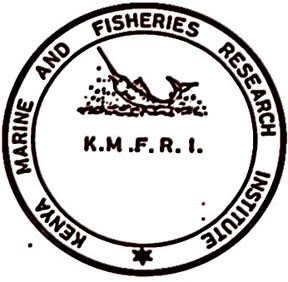
 Contacts
Contacts
Dr. Achim Meyer
+49 (0)421 23800 - 131
This email address is being protected from spambots. You need JavaScript enabled to view it.Dr. Levy Otwoma
Kenya Marine and Fisheries Research Institute (KMFRI)Dr. Sonia Bejarano
+49 (0)421 23800 - 51
This email address is being protected from spambots. You need JavaScript enabled to view it.Prof. Dr. Oscar Puebla
+49 (0)421 23800 - 168
This email address is being protected from spambots. You need JavaScript enabled to view it.
The Bremen Earth and Social Science Talks (BEST) aim to attract engaging and influential speakers from the world of academia to Bremen to share their thoughts and ideas.
The purpose of the series is to provoke discussion and debate about a range of subjects at the intersections between natural and social sciences, with a focus on pressing societal grand challenges such as sustainability, climate change, resource exploitation, and governance.
The 45-minute lectures are followed by a discussion of about 45 minutes and are delivered at a level that is accessible to a general scientific audience.
The Bremen Earth and Social Science Talks (BEST) are held in the large seminar room (ground floor) of the Leibniz Centre for Tropical Marine Research (ZMT), Fahrenheitstraße 6, 28359 Bremen.
The talks are free and open to the public, reservation is not necessary.
Programme for academic year 2018-2019
Thursday, June 20, 2019, 17:00-18:30, ZMT seminar room
The challenges of applying science to nature-based coastal protection
by Iris Möller
Dr. Iris Möller received her Ph.D. in Geography 1997, for a doctoral dissertation on ‘Wave attenuation over saltmarsh surfaces’ at the University of Cambridge. After a short spell of working at HR Wallingford Ltd, she joined the University of Cambridge’s Coastal Research Unit as a Research Associate and Deputy Director. She took up a Full-Time College Lectureship in Physical Geography at Fitzwilliam College of the University of Cambridge in 2000. Since 2014, she has held a University Lectureship in Physical Geography (Coastal Processes) at the Department of Geography, alongside continuing her role as Deputy Director of the Cambridge Coastal Research Unit. As an internationally recognised scholar, Dr Möller researches complex shallow coastal environments with a strongly applied focus on improving coastal flood and erosion risk management. She has over 40 peer-reviewed publications in international journals and is currently the Principal Investigator on ten and Co-Investigator on three collaborative research grants. Her 2013 true-to-scale experiment on the natural protection provided by salt marsh vegetation has been described by a reviewer as “just mind blowing and the results therefore unique and of incredible importance”.
Panel discussion with Sascha Klöpper:
Deputy Executive Secretary of The Common Wadden Sea Secretariat (CWSS)
https://www.waddensea-secretariat.org/trilateral-cooperation/common-wadden-sea-secretariat
Moderation:
Dr. Tim Jennerjahn
Programme for academic year 2017-2018
Thursday, December 6, 2018, 17:00-18:30, ZMT seminar room
Managing estuarine and marine areas to protect their natural functioning while delivering societal benefits
by Mike Elliott
Mike Elliott is the Professor of Estuarine and Coastal Sciences at the University of Hull, UK. He is a marine biologist with wide experience and interests including estuarine and marine ecology, policy, governance and management. He has published widely and has advised on many environmental matters for academia, industry, government and statutory bodies worldwide. He is a past-President of the international Estuarine & Coastal Sciences Association (ECSA) and is a Co-Editor-in-Chief of the international journal Estuarine, Coastal & Shelf Science; he has Adjunct Professor and Research positions at universities in Europe, Asia and Africa. Professor Elliott is also a member of several national and international committees linking marine science to policy.
Panel discussion with Prof. Dr. Karsten Reise:
Karsten Reise is a Professor emeritus at the University of Kiel who led the Wadden Sea Station Sylt of the Alfred Wegener Institute, Helmholtz Centre for Polar and Marine Research, for a long time. He is a biologist and an engaged environmentalist who almost spent his lifetime in science on studying and protecting the Wadden Sea and he contributed significantly to the efforts of making it a UNESCO World Heritage Site. Professor Karsten Reise is currently studying the response of coastal seas to invasive species and providing concepts for the adaptation to and mitigation of outcomes of sea level rise of low-lying northern Germany.
Moderation:
Dr. Tim Jennerjahn
Thursday, September 20, 2018, 17:00-18:30, ZMT seminar room
Protecting the coast and the ocean from chemical pollution
by Lena Gipperth
Lena Gipperth is a Professor in Environmental Law at the School of Business, Economics and Law, University of Gothenburg. Her research focuses on the legal implementation of environmental objectives, in particular relating to water and marine resources. She has been involved in several trans- and multidisciplinary research programmes and is now a part of the FRAM Centre for Future Chemical Risk Assessment and Management Strategies (https://fram.gu.se). Since 2015 she is the Director of the cross-faculty Centre for Sea and Society, an entrance to all marine and maritime activities at the University of Gothenburg.
Panel discussion:
Dr. Berit Brockmeyer
Dr. Berit Brockmeyer is head of the section “Environmentally hazardous substances” in the Department “Marine Sciences” (sub department “Chemistry of the Ocean”) at the Federal Maritime and Hydrographic Agency (BSH). Her tasks include monitoring pollutants in water and sediments from the North Sea and the Baltic Sea as well as research into the detection of pollutants.
Moderation:
Dr. Tim Jennerjahn
Thursday, May 17, 2018, 19:00-20:30, Venue: Universum® Bremen, Wiener Straße 1A, 28359 Bremen
Historical Social Collapse
by Rafael Reuveny
Rafael Reuveny is professor at the School of Public and Environmental Affairs, Indiana University, Bloomington, Indiana, USA. His research centers on the collapse of historical societies, migration associated with climate change, health impacts of climate migration, and causes of collective violence. He is author of many articles and books. He was programme chair of the meetings of the Global International Studies Conference in Ljubljana, Slovenia. He won two teaching awards at Indiana University and is the co-recipient of the 2007 Award of Excellence in World Society Research, from the World Society Foundation, Zurich. Professor Reuveny is also expert in the political economy of the Middle East.
Panel discussion:
- Dr. Johanna Wehkamp, Mercator Research Institute (MCC), Berlin
Moderation:
Prof. Dr. Agostino Merico, Systems Ecology (ZMT)
Programme for academic year 2016-2017
Thursday, June 29, 2017, 19:00-20:30, Venue: Universum, Wiener Str. 1a, Bremen
Impact of Fisheries and Global Warming on Marine Ecosystems
by Daniel Pauly
Daniel Pauly is University Killiam Professor at the Institute of Oceans and Fisheries, University of British Columbia, Canada, and Principal Investigator of the Sea Around Us. He has devoted his life to studying, documenting and promoting policies to mitigate the impact of fisheries on the world’s marine ecosystems. The concepts, methods and software he developed are documented in over 1,000 publications, which received more than 60,000 citations. His work has been recognized by numerous awards, notably the International Cosmos Prize, Japan, the Volvo Environmental Prize, Sweden, the Ramon Margalef Prize from the Government of Catalonia and the Peter Benchley Award.
Panel discussion:
Dr. Gerd Kraus, Director Thünen-Institute of Sea Fisheries
Mrs. Valeska Diemel, Director of Black Fish Germany
Moderation:
Prof. Dr. Agostino Merico, Systems Ecology (ZMT)
Tuesday, April 25, 2017, 17:00-18:30, ZMT seminar room
Seagrass global crisis – how to survive exposure to hypoxia and sulfide
by Marianne Holmer
Marianne Holmer is professor at the Department of Biology at University of Southern Denmark. Her research interests are in marine plant ecology and sediment biogeochemistry with particular interests in understanding ecosystem level dynamics of plants communities in response to resource, stress and disturbance gradients. Current research focuses on seagrass response to biogeochemical changes in temperate and tropical seagrass meadows in response to anthropogenic and natural disturbances. She has been head of department since 2010.
Panel discussion:
Mr. Tim Schröder, Science Journalist
Prof. Dr. Dieter Hanelt, Aquatic Ecophysiology and Phycology, University of Hamburg
Moderation:
PD Dr. Tim Jennerjahn, Ecological Biogeochemistry (ZMT)
Thursday, November 17, 2016, 17:00-18:30
Self organisation of diversity in living systems
by Kim Sneppen
Professor Kim Sneppen is the head of the Center for Models of Life at the Niels Bohr Institute in Copenhagen, Denmark. His background is in nuclear physics, statistical mechanics, and complex systems. His articles on punctuated equilibrium in evolution, genetic networks, epigenetics, and phage biology are highly cited. Some of his recent work suggests new approaches to understand influenza epidemics, provides an extension of the competitive exclusion principle in food-webs, and offers a new view on DNA methylation in the human genome.
Panel discussion:
Prof. Dr. Marc-Thorsten Hütt, Computational Systems Biology (Jacobs University)
Prof. Dr. Stefan Bornholdt, Complex Systems (Bremen University)
Prof. Dr. Achim Schlüter, Institutional & Behavioural Economics (ZMT)
Moderation:
Prof. Dr. Agostino Merico, Systems Ecology (ZMT)
Thursday, October 27, 2016, 17:00-18:30, ZMT seminar room
Grappling with a Changing Ocean: Coral reefs, people and COP21 agreement
by Ove Hoegh-Guldberg
Ove Hoegh-Guldberg is the Professor of Marine Science at the University of Queensland, and is among the most cited scientists working on the biological impacts of climate change. His research interests range from physiology and ecology of coral reefs, to the impact of climate change on ocean processes. He was Coordinating Lead Author (Oceans) for the Fifth Assessment Report of the Intergovernmental Report on Climate Change and was awarded the HSH Prince Albert II’s prize for climate change in 2014.
Panel discussion:
Prof. Dr. Dieter Wolf-Gladrow, Marine Biogeosciences (AWI)
Prof. Dr. Anna Katharina Hornidge, Development & Knowledge Sociology (ZMT)
Dr. Sebastian Ferse, Human Agency, Resilience and Diversity in Coral Reefs (ZMT)
Moderation:
Prof. Dr. Agostino Merico, Systems Ecology (ZMT)
Thursday, September 8, 2016, 17:00-18:30 (inaugural lecture), ZMT seminar room
Physics-biology links enable self-recruitment of estuarine and coastal fauna and flora
by Eric Wolanski
Professor Eric Wolanski is a coastal oceanographer at James Cook University, Australia. His research interests centre on the interaction between physical and biological processes determining ecosystem health in coastal waters. Eric is a fellow of the Australian Academy of Technological Sciences and Engineering and a member of the College of Experts of the Australian Research Council. He was awarded a Queensland Information Technology and Telecommunications Award for Excellence, an Australian Centenary Medal, a Doctorate Honoris Causa by the catholic University of Louvain, and a Lifetime Achievement Award by the Estuarine & Coastal Sciences Association.
Panel discussion:
Prof. Dr. Achim Schlüter, Institutional & Behavioural Economics (ZMT)
Prof. Dr. Agostino Merico, Systems Ecology (ZMT)
Prof. Dr. Martin Zimmer, Mangrove Ecology (ZMT)
Moderation:
PD Dr. Tim Jennerjahn, Ecological Biogeochemistry (ZMT)
 Contacts
Contacts
Welcome to the ZMT Data Roundtable!
The purpose of the ZMT Data Roundtable is to provide a discussion platform about topics related to computational statistical data analysis. These topics include approaches to statistical data analysis, data handling, plotting, etc. - in R, but also in other computing languages. The Data Roundtable consists of the following two components:
- Monthly seminars: Once a month you are invited to join the Data Roundtable meetings, which can take the format of (i) a seminar, where an invited speaker presents an interesting new approach to data analysis, (ii) a trouble-shooting session, where three participants briefly (~10min) present a particular issue, followed by a discussion (~20min) to find a solution for that issue, and (iii) an open-coding session, where you are welcome to just bring your computer to work alongside your colleagues with the opportunity to ask questions whenever they arise.
- Online GitHub organization: The backbone of the Data Roundtables is a GitHub organization consisting of repositories to archive and develop the data and scripts discussed during the monthly meetings, and an issue tracker to post questions and vote, which of them should be discussed during the trouble-shooting sessions. The Github organization is private so that you may also discuss unpublished data within the Data Roundtable community. Furthermore, it provides an opportunity to ask questions and receive help even if you are not able to attend the monthly meetings.
The Data Roundtable is not a teaching tool, hosted by a few experts. It lives because of the participation of the whole data roundtable community. Anyone who is interested can contribute: The data roundtables are open to any academic level (students, doctoral candidates, postdocs, group leaders, technicians) from ZMT but also from external institutes.
Upcoming meetings
First Data Roundtable in 2021: Thursday, 18.11.2021, 3:00-4:30 pm
Fridolin Haag will give a talk about "Understanding hypothesis tests as linear models".
Mini Abstract: Most of the common statistical hypothesis tests (T-test, ANOVA, ANCOVA, chi-square, etc) can be formulated as special cases of linear models (think y=a⋅x+b ). This means we can understand many tests by learning just one common framework, which may make our life as scientists much easier. In the session, I will explain the relationship between tests and linear models and we will calculate some examples to see their equivalence. You are welcome to bring cases of hypothesis testing you use in your work to discuss.
Archive of the past meetings (login required): https://github.com/ZMT-Data-Roundtable
Please contact This email address is being protected from spambots. You need JavaScript enabled to view it. if you have questions related to the Data Roundtable.





